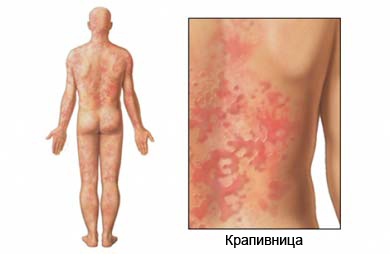Alimentary allergy
Description of food allergy
Alimentary allergy – adverse or abnormal reaction to a food or dietary supplement.
Causes food allergies
Most of the adverse reactions to food cause quite little food. The most common causative agents of food allergies include:
- Cow's milk;
- Eggs;
- Peanuts;
- Wheat;
- Soy;
- Fish;
- Clams;
- Nuts (eg, walnuts);
- Sesame.
Risk factors for food allergy
Factors, which increases the risk of food allergies:
- Age: children's;
- Eczema;
- The presence of other types of allergies, including hay fever.
Symptoms of food allergies
Symptoms include:
- Gurgling stomach;
- Stomach cramps, pain;
- Nausea;
- Vomiting;
- Diarrhea;
- Skin rash, especially hives;
- Itching;
- Cough;
- Breathlessness;
- Hripota;
- Swelling of the lips, mouth, language, throat;
- Nasal congestion;
- Lowering blood pressure.

Diagnosis of food allergy
The doctor need to know about your symptoms and medical history. It is necessary to make a physical inspection. Food allergies are often diagnosed based on his own observations of the victim. When symptoms occur, you must pay attention to food, which has recently taken.
Tests may include:
An elimination diet
The patient may be asked to go on an elimination diet. This should be done under medical supervision. Excluded from the diet-products suspected allergens. If symptoms are reduced or, the doctor can almost always make a diagnosis. If the resumption of consumption of products excluded symptoms return, The diagnosis is confirmed. Most often, this is only done in cases of skin irritation or atopic dermatitis. An elimination diet should not be used in cases of severe allergic reactions or symptoms of anaphylaxis. These include wheezing, shortness of breath and drop in blood pressure.
Each sample
The doctor puts a small piece of food on the body, usually on the forearm or back, then a fine needle makes a scratch. If there is swelling or redness, Allergic reactions may be present. The doctor diagnoses, based on symptoms and skin test. Some skin tests can have a severe allergic reaction. This test should be performed only under the supervision of a physician or other trained medical personnel. If you have severe eczema results of this test hard to interpret.
RAST or ELISA tests
Your doctor may order a blood test (GROWTH – radioallergosorbent test or ELISA – Enzyme immunoassay). These tests measure the level of IgE in blood proteins. IgE is a type of protein, which the body produces, when brought into contact with an allergen. The presence of IgE in the blood may indicate allergic.
Treatment of food allergy
We need to avoid foods and food ingredients, which cause allergic reactions. If you suspect an allergic reaction from consumer products, and shortness of breath, you need to call an ambulance.
Treatment includes:
- Treatment antihistamines – to decrease swelling and itching;
- Adrenaline – introduced immediately in case of a severe, a life-threatening reaction (anaphylaxis);
- Corticotherapy – Severe swelling in the, the presence of blisters and itching.
Prevention of food allergy
To prevent food allergies need to:
- Avoid a meal, to which there is an allergy;
- To study the composition of foods before consumption (manufacturer information on packaging);
- If you have food allergies, and visiting cafes or restaurants to ask staff to order food ingredients;
- Remember Titles (synonyms) for all allergens. This will help to identify them in the list of ingredients;
- If there is severe, anaphylactic food allergies, you need to see a doctor, to get a dose of adrenaline (typically syringe), and carry it with you for emergencies.
